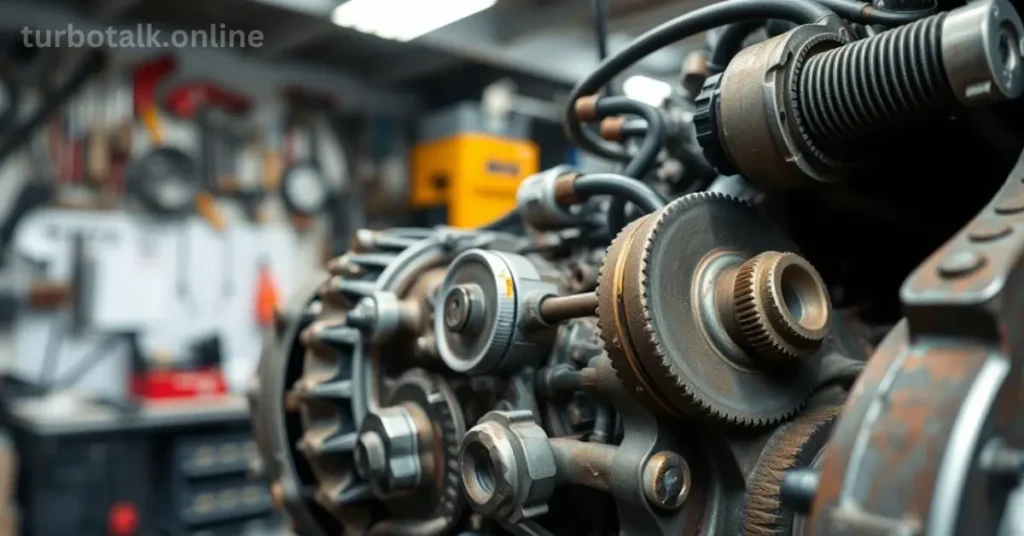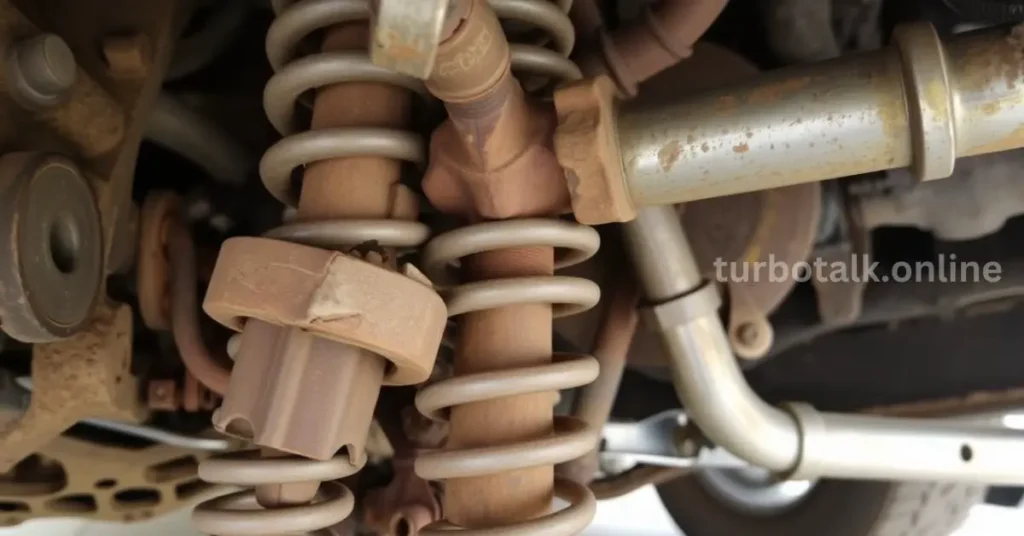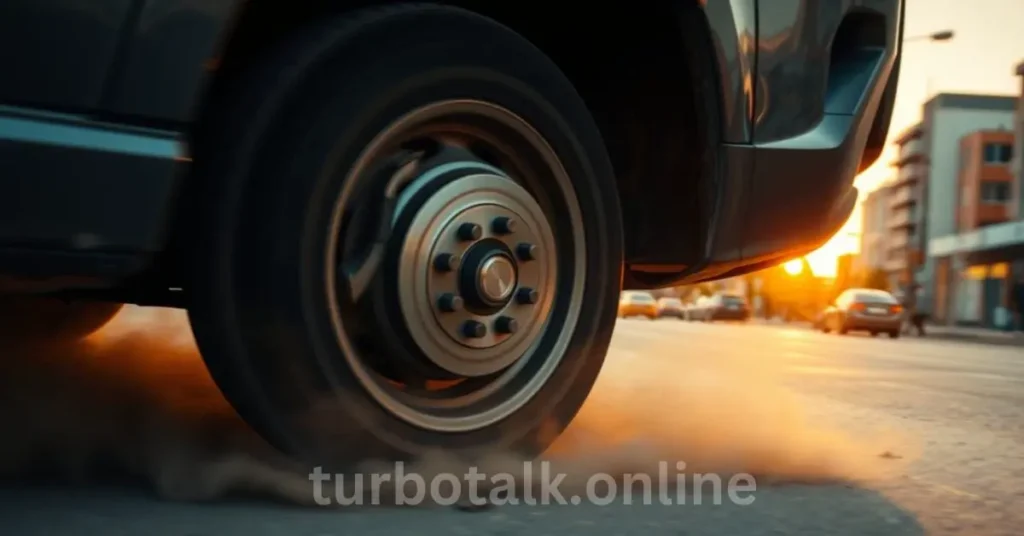Did you know that over 100,000 miles, the transmission of a 2003 Acura MDX needed a rebuild? This fact shows how crucial it is to know why your car might jerk when you slow down. We’ll look at common causes like transmission and brake problems, engine issues, and more. We’ll also give you fast solutions to make driving smooth again.
Common Reasons Your Car Jerks When Slowing Down

If your car jerks, stutters, or surges when you slow down, there could be several reasons. These include transmission issues and brake system problems. Knowing what causes these issues can help you fix them quickly.
Transmission Issues
A car may jerk when slowing down due to transmission problems. Problems like a worn clutch or torque converter, or low transmission fluid levels, can cause this. These issues lead to uneven power delivery, making the car jerk.
Brake System Problems
Brake system issues can also make a car jerk when you slow down. Worn-out brake pads, warped brake rotors, or air in the brake lines can cause the brakes to grab unevenly. This results in a jerking motion.
Engine Misfires
Engine misfires, often caused by clogged fuel injectors or faulty sensors, can also lead to jerking when slowing down. These problems disrupt the engine’s smooth operation, causing uneven deceleration.
Fixing these common issues can make deceleration smoother and more comfortable in your car.
| Cause | Symptom | Solution |
|---|---|---|
| Worn Clutch or Torque Converter | Jerky Deceleration | Replace Clutch or Torque Converter |
| Low Transmission Fluid Levels | Uneven Power Delivery | Top Up Transmission Fluid |
| Worn Brake Pads | Grabbing Brakes | Replace Brake Pads |
| Warped Brake Rotors | Uneven Braking | Replace Brake Rotors |
| Air in Brake Lines | Spongy Brake Pedal | Bleed Brake System |
| Clogged Fuel Injectors | Engine Misfires | Clean or Replace Fuel Injectors |
| Faulty Sensors | Uneven Acceleration | Diagnose and Replace Faulty Sensors |
Transmission Faults Causing Jerky Deceleration
When you speed up or slow down, you might feel a jerk as the gears switch. This jerkiness often comes from the transmission, which helps power move from the engine to the wheels. Problems like a worn clutch or torque converter and low fluid levels can cause this jerky feeling.

Worn Clutch or Torque Converter
A manual transmission’s worn-out clutch makes shifting gears hard, leading to jerky deceleration. In automatic transmissions, a bad torque converter means gears change too slowly, also causing jerks when you slow down.
Low Transmission Fluid Levels
Having the right amount of transmission fluid is key for smooth gear shifts and component health. Low fluid levels make gear changes tough, leading to jerky deceleration. This can also wear out transmission parts faster, making things worse.
| Transmission Issue | Impact on Deceleration | Potential Causes |
|---|---|---|
| Worn Clutch | Jerky, uneven gear engagement | Excessive wear, improper adjustment |
| Faulty Torque Converter | Delayed gear changes, jerking sensation | Malfunction, mechanical failure |
| Low Transmission Fluid Levels | Difficulty in smooth gear shifting | Fluid leaks, improper maintenance |
Fixing these transmission problems is key for smooth, safe driving. A jerky deceleration is not just annoying; it can be dangerous. Regular maintenance, timely repairs, and checks can stop and fix these issues. This keeps your car running well and makes driving more comfortable.
Brake Problems Leading to Jerky Slowing Down
If your car jerks when you brake, it might be a brake problem. Things like worn-out brake pads and discs, and bad brake rotors can cause this. Also, an anti-lock braking system (ABS) failure can make braking jerky. Worn-out steering or wheel bearings can also make your car jerk when you brake.
Signs that brake parts are worn out include squealing, grinding, or scraping sounds when you brake. These sounds mean you need to replace the brake pads. If the brake pedal vibrates, it could mean the brake rotors are warped, making stopping uneven.
It’s important to check brake fluid levels too. If they’re dirty or low, it could mean there are leaks, which affect how well the brakes work.
Ignoring brake wear signs can make braking less effective, which can be dangerous when stopping suddenly. Regular automotive maintenance and fixing problems early can save money and keep your car’s value high.
Fixing jerking when you brake quickly is key for driving safety. It helps avoid big repairs and keeps your car running smoothly. By fixing brake issues fast, you get a smoother ride and keep your car’s suspension and wheel alignment in good shape.

What Makes Your Car Jerk While Slowing Down
Have you ever felt your car jerk or shudder when you hit the brakes? It’s not just annoying; it’s also a bit scary. There are many reasons why this happens, from worn-out suspension parts to faulty sensors. Knowing what’s causing it is key to fixing it and making sure you slow down smoothly.
Worn Suspension Components
Your car’s suspension system is vital for a smooth ride. It helps absorb road bumps and keeps your car stable. But when parts like shock absorbers or struts wear out, they can’t control the car’s movements well. This leads to a jerky feeling when you brake, as the suspension can’t keep up.
Faulty Sensors
Today’s cars have many sensors to check how well different systems work, like brakes and suspension. If these sensors don’t work right or give the wrong info, the car’s computer can make the brakes jerk. Finding and fixing these faulty sensors is important to solve this issue.
Fixing the jerky feeling when slowing down is key for safe and comfy driving. By taking care of things like worn suspension parts or bad sensors, you can make sure your car stops smoothly. This makes driving better and safer for you.
Preventive Maintenance for Smooth Deceleration
Keeping your car in good shape is key for smooth driving, especially when slowing down. Regular check-ups can stop problems like clutch slippage, ABS sensor malfunction, and suspension issues. This way, you avoid sudden stops and weird noises.
Focus on your brakes for a smooth stop. Check and replace brake pads and rotors often. Also, watch your wheel alignment and suspension components for a smooth slowdown.
Don’t forget about your car’s transmission. Check the fluid levels and fix any transmission issues. This stops jerky stops due to torque converter or clutch problems.
Keeping your engine and systems in check is also vital. Fix engine misfires and make sure sensors work right. This stops jerky stops from bad engine performance.
With a good maintenance plan, you can fix problems before they start. This means smooth, trouble-free deceleration in your car. Regular checks and repairs keep your car safe and running well.
| Maintenance Task | Frequency | Potential Issues Addressed |
|---|---|---|
| Brake System Inspection | Every 6 months or 6,000 miles | Worn brake pads, rotors, and other components |
| Wheel Alignment Check | Every 12 months or 12,000 miles | Wheel alignment problems, suspension issues |
| Transmission Fluid Check/Change | Every 30,000 miles or per manufacturer’s recommendation | Transmission faults, clutch/torque converter problems |
| Engine Diagnostic Inspection | Every 12 months or 12,000 miles | Engine misfires, sensor malfunctions |
Stay on top of maintenance to avoid problems and keep deceleration smooth. Follow the maker’s service schedule and fix issues fast to keep your car running great.
Conclusion
A jerking car when slowing down can come from many issues. These include transmission problems, brake issues, and engine misfires. Keeping up with your car’s maintenance, fixing problems fast, and driving carefully can stop these issues. This ensures a smooth slowdown.
If your car jerks when you brake or slow down, get it checked by a pro mechanic. They can find out what’s wrong. This might be transmission issues, brake problems, or worn suspension parts. Fixing these problems quickly helps your car run smoothly again and makes driving better.
Looking after your car’s transmission, brakes, and engine is crucial to avoid jerky braking. Regular servicing and inspections help a lot. By keeping up with maintenance and driving carefully, you ensure a safe and comfy ride on every trip.
FAQ About Car Jerks When Slowing Down
Is it safe to drive if my car jerks when I decelerate?
It’s not ideal, but you can drive short distances. Get it checked soon to avoid potential safety issues or further damage.
Will fixing the jerking problem be expensive?
Costs vary widely depending on the cause. Minor issues might be cheap, but major repairs could run into hundreds of dollars.
Can dirty fuel injectors cause my car to jerk when decelerating?
Yes, clogged injectors can cause jerking. A fuel system cleaning might solve it, which is usually an affordable fix.
Why does my car jerk when I let off the gas?
Common causes include transmission issues, worn spark plugs, or sensor problems. A mechanic can pinpoint the exact reason.
How soon should I get my car checked if it starts jerking?
Don’t wait – get it inspected within a week to prevent potential damage or safety hazards.
Our Recommended Blog Posts

